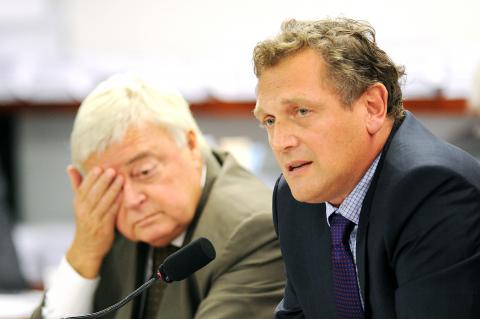Brazil must hurry up and pass a package of new laws if the 2014 World Cup is to go ahead, FIFA secretary-general Jerome Valcke told the country’s Congress on Tuesday, adding there was “not a day to lose.”
“Either we do [the Cup] together or we will never manage it,” said Valcke, pointing out that Brazil had first been asked to pass the legislation in 2007 when it was awarded the right to host the tournament.
Brazil’s Congress must agree to implement a number of special rules in the so-called World Cup law, covering matters ranging from the price of tickets to penalties for selling pirate merchandise and the sale of alcohol in stadiums.

Photo: AFP
Some of these rules override local laws, which has stirred up nationalistic sentiment in a country intensely proud of its soccer tradition and its economic progress.
Some members of Congress have already dug in their heels, threatening to delay the bill’s approval and adding to concerns over Brazil’s lagging preparations for the global showpiece.
Former Brazil striker Romario, himself now a congressman, is one of the most outspoken critics, saying the law would trample on the country’s sovereignty.
Valcke said Brazil was aware of FIFA’s conditions when it signed up to host the tournament and said similar requirements were made of recent hosts, including Germany in 2006 and South Africa last year.
“We haven’t changed a word of what was accepted and what was asked for by FIFA in 2007 so that Brazil would host this World Cup,” Valcke told a parliamentary commission scrutinizing the 40-page draft law before it is put to a plenary vote.
In one concession to Brazil’s concerns, Valcke said FIFA would offer a limited number of cut-price tickets for about US$25 each, after Brazilian President Dilma Rousseff told him that Brazil would not scrap half-price ticket rights for pensioners.
Those tickets would make up about 10 percent of the total.
However, he said FIFA would not back down on its demand that alcohol be sold in stadiums during the tournament and said there was no evidence that this had led to violent behavior at past World Cups. Some Brazilian states ban alcohol sales in stadiums.
The law would allow only FIFA sponsors’ beverages to be sold and prohibit advertising by sponsors’ competitors near stadiums.
Brazil, which is struggling to get stadiums and other vital infrastructure in place in time for the event, has already passed a law that exempts FIFA and its partners from taxes on revenue they will generate.
The World Cup law had been expected to be voted on this year, but Brazil’s sports ministry said on Tuesday it would not happen until next year after a decision to hold up to 20 more debates on it.

Freddie Freeman homered and drove in four runs, Shohei Ohtani also went deep and Roki Sasaki earned his first major league win as the Los Angeles Dodgers beat the Atlanta Braves 10-3 on Saturday night for their seventh straight victory. The Dodgers have won the first two games of the series to improve to 5-0 against Atlanta this year. Los Angeles’ three-game sweep at home early in the season left the Braves 0-7. Sasaki allowed three runs and six hits over five innings. The 23-year-old right-hander gave up a home run to Ozzie Albies, but received plenty of offensive support in his

INTER AWAIT: Superb saves by PSG ’keeper Gianluigi Donnarumma inspired the victory, as Arsenal were punished for misses, including one by Bukayo Saka Arsenal on Wednesday fell short on the big stage again as their painful UEFA Champions League semi-final exit against Paris Saint-Germain left Mikel Arteta to rue his club’s failure to provide him with enough attacking options. Arteta’s side were unable to reach the Champions League final for the first time in 19 years as PSG clinched a tense 2-1 win at Parc des Princes. Trailing 1-0 from last week’s first leg in London, the Gunners made a blistering start to the second leg, but could not convert their chances as Gianluigi Donnarumma’s superb saves inspired PSG’s 3-1 aggregate victory. Arsenal were punished for

Bayern Munich on Sunday were crowned German champions for the 34th time, giving striker Harry Kane his first major trophy, after second-placed Bayer 04 Leverkusen drew 2-2 at SC Freiburg. Bayern’s 3-3 draw at RB Leipzig on Saturday, when the Bavarians came from two goals down to take the lead before conceding a stoppage-time equalizer, meant defending Bundesliga champions Leverkusen needed to win at Freiburg to delay the title party. Leverkusen were two goals down before scoring twice in the final 10 minutes, but Xabi Alonso’s side could not find a third, as Bayern reclaimed the title at the first attempt after

THRILLER: Raphinha gave Barca a 3-2 lead with two minutes remaining of regular time, but Francesco Acerbi equalized the game in the second minute of added time Davide Frattesi on Tuesday fired Inter into the UEFA Champions League final with an extra-time winner that gave the Italians a stunning 4-3 triumph over Barcelona, 7-6 on aggregate. Italy midfielder Frattesi won a tie for the ages under a downpour in Milan when he lashed home in the 99th minute, sending a packed and rocking San Siro wild with joy. Simone Inzaghi’s team will face either Arsenal or Paris Saint-Germain at the end of this month in Munich, Germany, where they would feel they have a great chance to be crowned kings of Europe for a fourth time after